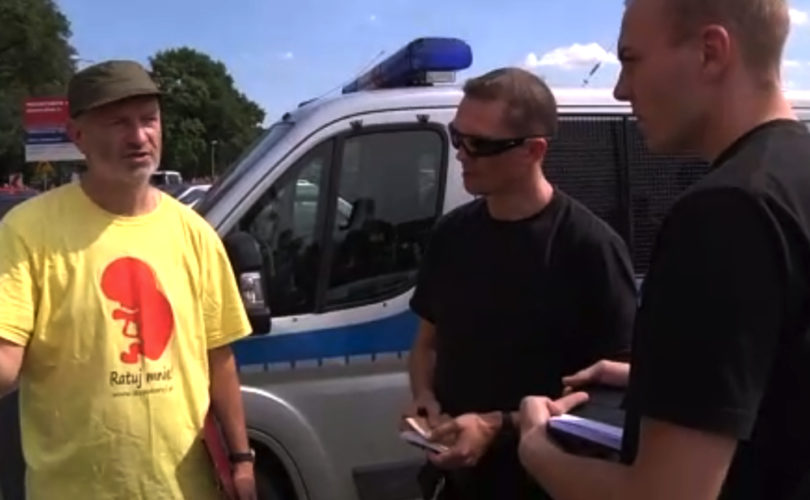KOSTRZYN, Poland, March 4, 2015 (LifeSiteNews.com) — Polish pro-lifers who were arrested in 2012 during a demonstration have been vindicated as the officers involved have now been sentenced for overstepping their authority.
“The battle for justice was hard fought,” Mariusz Dzierżawski, one of the pro-lifers involved with the case, told LifeSiteNews. “But the court finally stood up for the truth.”
The conflict started on August 2, 2012, in the small town of Kostrzyn, where members of the Right to Life Foundation were arrested while gathering signatures in support of the abortion ban and holding graphic anti-abortion pictures.
The pro-lifers had gone to Kostrzyn for the Polish Woodstock Festival (Przystanek Woodstock), considered the largest open-air festival in Europe. The festival is not only a musical event, but also a forum for discussion where politicians, artists, journalists, and religious leaders meet with the young concertgoers. Different non-governmental organizations are also present.
This was not the first time the Right to Life Foundation attended Woodstock. In 2009 the Foundation appeared outside the festival, but, according to Dzierżawski, eight to ten “unknown perpetrators” armed with knives, sticks, and gas destroyed their exhibit. After the pro-lifers fixed the damage, the security personnel for the festival, called the Peace Patrol, confiscated the posters. “The prosecutor conducted the case ineptly and nobody was found responsible,” Dzierżawski concluded. Destruction of the group’s posters has never deterred them from continuing their mission, however.
The 2012 exhibit was eliciting mostly supportive reactions and a discussion among the bystanders when the police came in vans and arrested Foundation members, even though they had not broken the law.
The police confiscated a large poster depicting an aborted baby, a child with Down syndrome, and Adolf Hitler, who first legalized abortion on demand for Poles in 1943. The police charged that the poster contained “indecent material,” but declined to specify what was indecent about the poster.
Dzierżawski, who was among those arrested, said, “The police broke basic laws, and acted with confidence that they would be left unpunished, even though I tried to explain that they were breaking the law.” He complained that later the prosecutor refused to bring the police to justice, even after the judge required him to do so.
The pro-lifers complained to the officers’ superiors, and even to Jacek Cichocki and Bartłomiej Sienkiewicz, two consecutive Ministers of the Interior, who supervise the country’s police force. However, all of them denied that the policemen had done wrong.
Finally the Foundation was represented by the Ordo Iuris Institute. After a two-and-a-half-year legal battle, on February 20 the court in Słubice sentenced the policemen, identified only as Tomasz F., Dariusz F. and Artur B. to four months in prison and two years probation. The verdict may still be appealed, so according to Polish law the full names of the policemen cannot yet be published.
Ironically, the sentenced officer Artur B. was recently moved to a higher position. LifeSiteNews asked why he was not suspended instead. Sławomir Konieczny, the police spokesperson for the police in Gorzów, claimed this move was merely a change of position, not a promotion.
Dzierżawski credits his legal victory to help from Ordo Iuris, especially to Łukasz Jończyk, who represented him. At the beginning of the legal proceedings, Jończyk secured access to recorded conversations of the arresting policemen and their superiors. These revealed that the policemen had acted because their superiors had ordered them to do so. Dzierżawski also attributes the victory to Razem.tv, a private internet television station that filmed the entire arrest. The recording was made available during court proceedings.
This is not the end of the Right to Life Foundation’s legal problems, however. The pro-lifers organize hundreds of pickets per year and even though most are properly protected by the police, problems arise when these pickets involve politicians.
After a picket with a poster of Hanna Gronkiewicz-Waltz, the Warsaw mayor who had fired Dr. Bogdan Chazan for refusing an abortion referral, the police questioned five pro-lifers at the police station. Similarly, pro-life activists faced accusations after another picket involving a picture of Congresswoman Wanda Nowicka, who once led a pro-abortion organization and received money from the pharmaceutical firm Gedeon Richter and from Ipas, a U.S. producer of abortion equipment. This time the pro-lifers faced a charge of “demeaning government officials,” a legal relic from Poland’s Communist past.
“The police and the prosecutors should protect the law, and not be servants of the politicians,” Dzierżawski stated. “The superiors who forced the policemen to act against the law should be punished. Otherwise, the problem will spread even more.”

